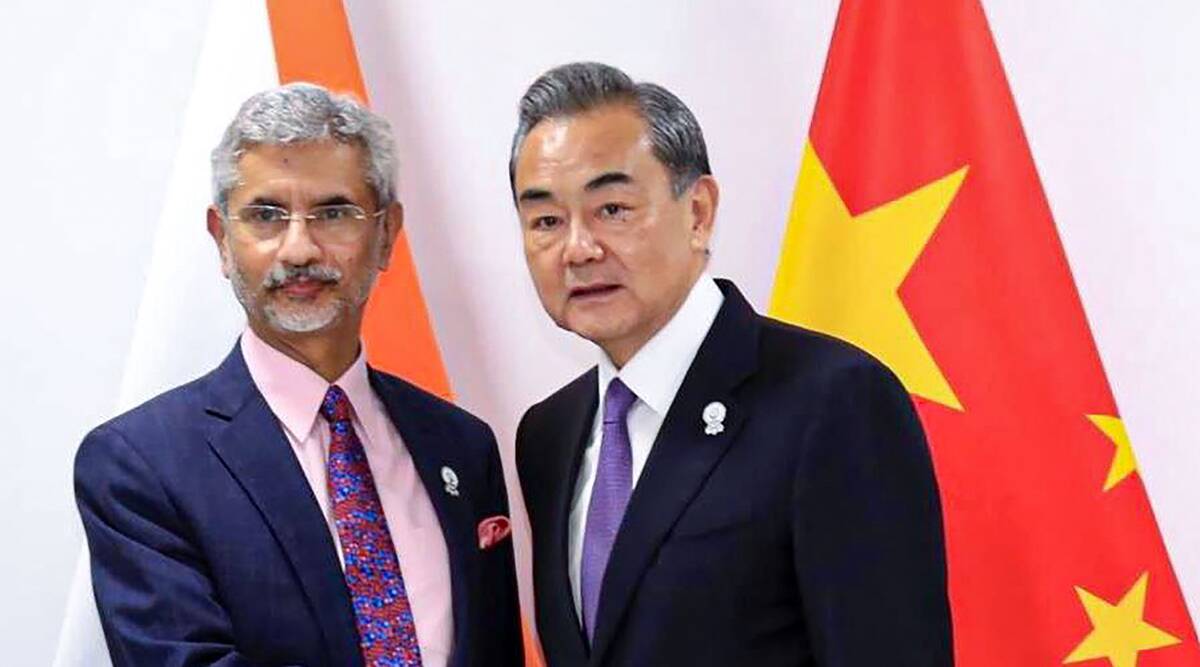 In a statement posted on its website on Thursday on Wang's talks with Jaishankar, the Chinese Foreign Ministry said, the minister stated that India-China relations remained at a "low point" while the situation at the border has "generally been easing". (PTI)
In a statement posted on its website on Thursday on Wang's talks with Jaishankar, the Chinese Foreign Ministry said, the minister stated that India-China relations remained at a "low point" while the situation at the border has "generally been easing". (PTI) A day after External Affairs Minister S Jaishankar conveyed to his Chinese counterpart that prolongation of the existing situation in eastern Ladakh was impacting bilateral ties in a “negative manner”, the Chinese Foreign Ministry said that Foreign Minister and State Councillor Wang Yi had said China was ready to seek a mutually acceptable solution to issues that require an “emergency response” through negotiation and consultation.
According to the statement posted on the Chinese Foreign Ministry website on Thursday, Wang also said that the two sides “must place the border issue in an appropriate position” in bilateral relations, expand the positive momentum of bilateral cooperation, and create favourable conditions for resolving differences through negotiation.
This divergence of approach has persisted for the last 14 months as New Delhi and Beijing have reiterated their stated positions.
The Chinese Foreign Ministry said that “Jaishankar agreed with Wang Yi’s general assessment of China-India relations and said as two major developing countries, India and China have a lot in common and should enhance cooperation in various areas.
“India has not changed and does not want to change the strategic assessment of India-China relations. India is willing to work with China to push bilateral relations out of a slump. India and China must find a solution to the border issue that is in the interest of both sides through dialogue and consultation and at the same time make sure not to take unilateral actions to prevent the situation from getting complicated.”
Divergence of approach
The divergence in approaches — India wants full restoration of status quo while China wants to put the border issue in an ‘appropriate’ position and get on with other things — has persisted for the last 14 months as New Delhi and Beijing have reiterated their stated positions.
The Chinese readout of the hour-long in-person meeting on the sidelines of an SCO conclave in Dushanbe on Wednesday also quoted Wang as saying that the relations between India and China “are still at a low level which is not in the interest of either side”.
The meeting in Tajikistan’s capital took place with the disengagement process stalemated at the remaining friction points in eastern Ladakh. The two militaries withdrew troops and weapons from the Pangong Lake area in February following a series of military and diplomatic talks to resolve the standoff that began in May 2020.
According to the Chinese Foreign Ministry statement, the Minister said that the overall situation in the border area has de-escalated after the withdrawal of troops from the Galwan Valley and Pangong Lake areas.
Wang reiterated China’s oft-repeated stand that it was not responsible for the border standoff. He, however, said that “China is ready to find a solution acceptable to both sides on the issue that needs emergency response through negotiation and consultation”.
“China’s strategic assessment of China-India relations has not changed,” Wang said. “China and India pose no threat but offer development opportunities to each other. The two countries are partners rather than rivals or enemies.”
The principles of China-India relations should still be mutual respect for sovereignty and territorial integrity, mutual non-aggression, non-interference in each other’s internal affairs, and mutual respect for each other’s core interests, he said.
The interaction between the two countries should still be seeking mutual benefits and complementarity, pursuing healthy competition and avoiding confrontation, with cooperation as the main theme, Wang said.
Meanwhile, sources in the security establishment said that China is building permanent structures on its side across the Line of Actual Control (LAC), and that one such permanent structure has been recently noticed across Naku La in Sikkim on the Chinese side.
The sources said it was not confirmed what kind of base this was. However, such structures have been coming up across the border for the past few years, they said.
“They already have extremely good and wide network of roads reaching up to the border in all sectors from Ladakh to Arunachal Pradesh. Their border outposts have always been far more equipped than ours. Since the Doklam episode (2018), they have started building permanent military and civilian infrastructure close to the border with greater pace. This one is in line with that,” a military official said.
On Wednesday, the Ministry of External Affairs had said in New Delhi that Jaishankar had told Wang that any unilateral change in the status quo along the LAC was “not acceptable” to India, and that overall ties could only develop after full restoration of peace and tranquillity in eastern Ladakh.
The two Ministers agreed that the next round of military dialogue should be held at the earliest, and that it should discuss all remaining issues and seek a mutually acceptable solution, the MEA statement said.
Assessing the overall relationship, Jaishankar emphasised that maintenance of peace and tranquillity in the border areas has been the foundation for the development of ties since 1988, the statement said.
Wednesday’s meeting between Jaishankar and Wang was the first since their talks in Moscow on the sidelines of another SCO conclave in September last year.
In Moscow, the two sides had reached a five-point agreement to resolve the border dispute. It included measures like quick disengagement of troops, avoiding action that could escalate tensions, adherence to all agreements and protocols on border management, and steps to restore peace along the LAC.
- The Indian Express website has been rated GREEN for its credibility and trustworthiness by Newsguard, a global service that rates news sources for their journalistic standards.

